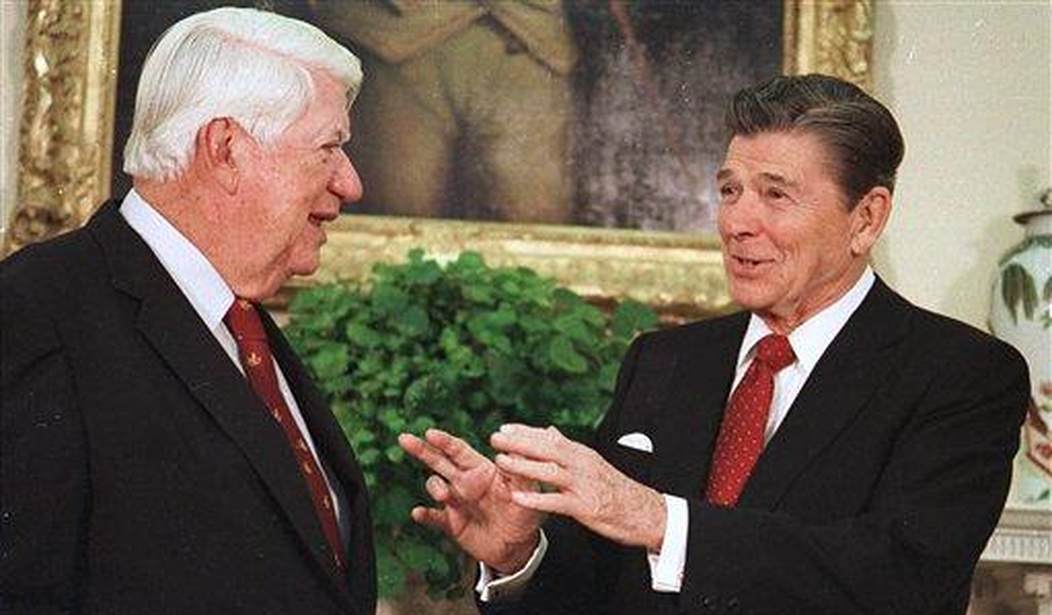There was a time when we could talk to people we disagreed with.
Too many people, not just now but always, live in their personal comfort zones. They only read things they already know they will agree with; they only associate with people who share most of their opinions and attitudes. That's understandable, up to a point. The thing about one's comfort zone, after all, is that it's comfortable. But learned discourse with people we disagree with, reading materials that challenge our existing notions and biases, that's important, too. And it sadly seems to be an art we're losing, especially in conversation; we are losing the ability to talk civilly with people we disagree with. And that's too bad.
It wasn't always thus. As recently as the two terms of President Reagan, the Gipper was famous for his unofficial policy that politics ended at 6:00 PM, and President Reagan was known for inviting members of the opposing party, more notably Speaker of the House Thomas "Tip" O'Neill, over to the White House for evening drinks. Can you imagine such a scene now? Does it seem likely that Hakeem Jeffries or Chuck Schumer would accept such an invitation from President Trump?
I've described before my good friend who is, candidly, a deep-blue, East Coast urban progressive. We remain friends despite our wildly divergent political views; the friendship formed out of the two of us working as a team on several consulting projects. We always worked together well; our skills and experiences complemented each other, as did our strengths and weaknesses. He has a better eye for hidden details, where I was better at dealing with people and persuading them of what had to be done. Most of all, on the job, we listened to each other, and we both would admit if we were wrong. We made a great team. People in the industry sought us out to work as a team.
But we can't talk politics. He becomes very quickly arrogant and condescending when that topic comes up, and I finally had to tell him that the continuation of the friendship, which we both value, depended on his either remaining civil on that topic, or us just avoiding the subject. We decided on the latter. Now we still talk regularly, about our families, about travel, about Japan - he grew up in Tokyo - and about a variety of things. Just not politics, and that's too bad, because we learn more about our own opinions by talking to people who don't agree with us than by remaining in a self-affirming bubble.
There are keys to conversation that too many people seem to be losing. Some things to avoid:
- Avoid spending the time another is speaking, thinking only of what you'll say next.
- Don't interrupt. Not only is it rude, it's slamming the door on the conversation. Personally, I'll walk the heck away from someone who keeps interrupting me, and I find it difficult to take such an ill-mannered person seriously.
- One-upping. It's not a competition.
- Filibustering. A conversation should be an exchange of ideas, not a lecture.
There are some things you should remember to do:
- Listen to the person you're talking to. Listen carefully. Think about what they are saying. And if you need to pause for a moment when they are done, then do so.
- Look the other person in the eye. Evading a direct gaze is a sign that one is dissembling; avoid that prospect.
- Always tell the truth. Don't make up anecdotes; if you employ a metaphor or an apocryphal saying, make sure that you plainly state what you're doing. Facts are important. Facts are critical. Know them.
Read More: Hillary Clinton Has a Truly Twisted Take on Trump and Losing Elections in New Interview
In the political realm, passions have always run high. I could refer you to Massachusetts Senator Charles Sumner, who in 1856 was attacked and beaten by Representative Preston Brooks of South Carolina, over a disagreement about slavery. We have not yet seen a return to that kind of behavior in the House or the Senate - yet. But civility does seem to have gone by the wayside, and that loss has come from, let's be honest, Democrats. It is from the left that almost all of the unreasoned anger has come; the left, not the right, is the first to call for violence if they are thwarted. And their voters, most notably in the summer of 2020, have answered that call.
Will we ever be able to talk to each other again?
It is through intelligent discourse that we grow as thinking beings. We should be able to deal civilly with people who disagree with us; such is the essence of civilization. The loss of that ability, the death of civil conversation, has sadly (but not surprisingly) come in great part from the left, and it's becoming harder to see a way back from that.
The French Renaissance philosopher Michel de Montaigne is reported to have said:
There is no conversation more boring than the one where everybody agrees.
He makes a good point. There's nothing to be learned in a bubble, and there's nothing to be learned from anger. We should learn, again, how to talk to each other.
Will we, though? As long as America's left stays on its present course, I think not.














